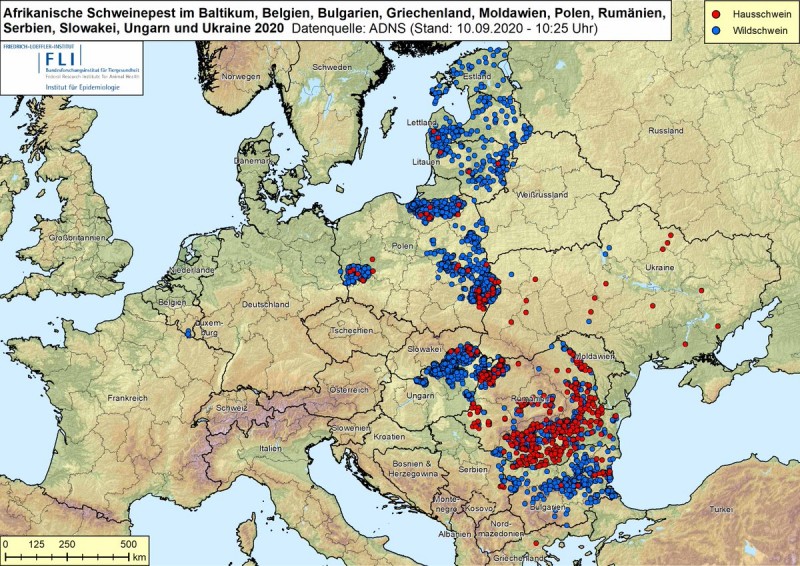
Written by Alistair Driver
Germany has confirmed its first case of African swine fever (ASF) in a wild boar in Germany very close to the Polish border.
The news, not unexpected given the proximity of ASF in wild boar a few kilometres away in Poland, has sparked concerns about a possible knock-on effect for the EU pork market, if German exports are banned, particularly by China.
The suspected case was detected in a wild boar carcase found in the eastern state of Brandenburg, and bones found carcase were sampled. The Berlin-Brandenburg State Laboratory detected the specific genome sequences of the ASF virus in the samples taken on site and the Friedrich-Loeffler-Institute (FLI) confirmed the finding on Thursday.
The carcase was decayed suggesting ‘the entry took place a few weeks ago’, the FLI said.
The animal was found just 6km from the Polish border and only 30km from the the last confirmed case of ASF in Poland. This makes an entry by a migrating wild boar likely, although introduction by humans through contaminated food cannot be ruled out, the institute said.

It said the responsible veterinary authorities on site must now take the necessary measures and stressed that it was ‘now extremely important for farmers to carefully observe farm biosecurity’.
“This still offers the best protection against the pathogen entering farm animal populations. The pig keeping hygiene regulation serves as the legal basis for this,” the institute said.
It said wild boars that have died should continue to be intensively examined nationwide for the presence of ASF and any found dead should be reported immediately to the responsible authorities.
“The suspected case unfortunately has been confirmed,” German Agriculture Minister Julia Kloeckner told a news conference in Berlin on Thursday morning, Bloomberg reported.
She said the infected area will be cordoned off. The authorities have prepared for the eventuality of ASF occurring in Germany and will be putting in place measures to prevent the disease spreading further, she added.
High alert
Germany has been on high alert for ASF, and was considered at high risk of infection, ever since a spate of cases emerged in wild boar in western Poland, in some cases as close as 10km from the German border. Measures put in place to prevent disease entering Germany included building fences on the border and culling wild boar.
Germany is the EU’s biggest pork producer and one of the world’s biggest pork exporters, shipping around 500,000 tonnes per year, including huge volumes to China. There are fears that a confirmed case could result in damage that trade, with a wider knock-on effect on the German and EU pork market.
A confirmed case would come as further blow to a sector that has suffered from processing plant shutdowns during COVID-19, including the closure of a large Tonnies plant, which had a major impact on the market.
In a report published in February, AHDB said EU prices could drop by 20-40% if ASF hits Germany, although the consequences of an outbreak for the EU market would not be as severe as it would have been 18 months ago, due to the ongoing demand for pork from China.
If German pork can no longer be sent, as other exporters are now shipping so much out of the EU, supplies on the EU market could increase to levels similar to those seen in 2018, the report said.
Get Our E-Newsletter - breaking news to your in-box twice a week
See e-newsletter example
Will be used in accordance with our Privacy Policy
Continue reading on the Farm Business Website...





